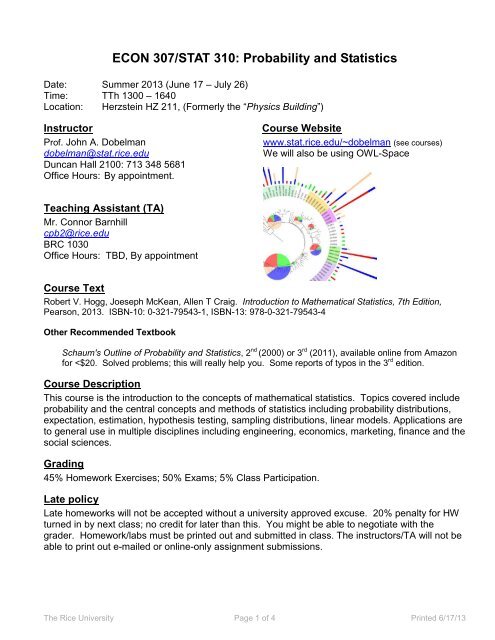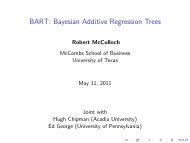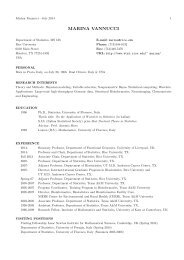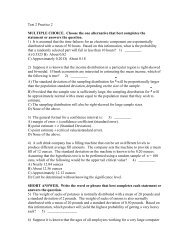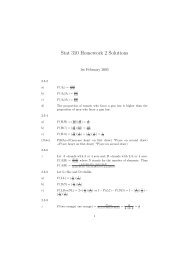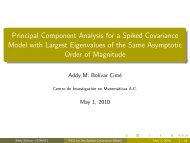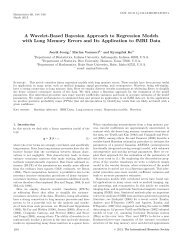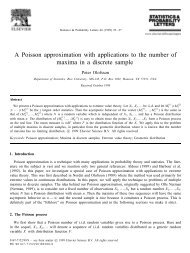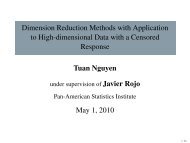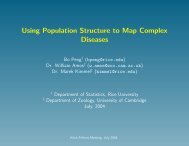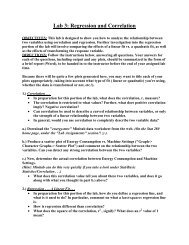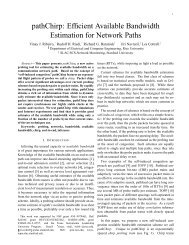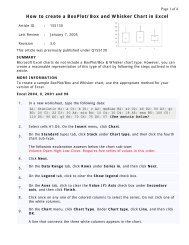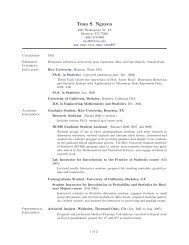ECON 307/STAT 310 - Rice University
ECON 307/STAT 310 - Rice University
ECON 307/STAT 310 - Rice University
You also want an ePaper? Increase the reach of your titles
YUMPU automatically turns print PDFs into web optimized ePapers that Google loves.
<strong>ECON</strong> <strong>307</strong>/<strong>STAT</strong> <strong>310</strong>: Probability and StatisticsDate: Summer 2013 (June 17 – July 26)Time: TTh 1300 – 1640Location: Herzstein HZ 211, (Formerly the “Physics Building”)InstructorProf. John A. Dobelmandobelman@stat.rice.eduDuncan Hall 2100: 713 348 5681Office Hours: By appointment.Course Websitewww.stat.rice.edu/~dobelman (see courses)We will also be using OWL-SpaceTeaching Assistant (TA)Mr. Connor Barnhillcpb2@rice.eduBRC 1030Office Hours: TBD, By appointmentCourse TextRobert V. Hogg, Joeseph McKean, Allen T Craig. Introduction to Mathematical Statistics, 7th Edition,Pearson, 2013. ISBN-10: 0-321-79543-1, ISBN-13: 978-0-321-79543-4Other Recommended TextbookSchaum's Outline of Probability and Statistics, 2 nd (2000) or 3 rd (2011), available online from Amazonfor
ExamsExams will be closed book, open calculators. If take-home, NO INTERNET is permitted. Due tothe ubiquity of the Web, however, exams will probably conducted in-class. A single pagecheatsheet is permitted for each exam.AttendanceStudents are expected to attend class. Much material is presented in class which might nototherwise be in texts, notes, etc. Attendance will be reflected in the Class Participation portion ofthe course grade. Although we plan on keeping the course website up to date, if a student missesa class, then he/she is responsible for keeping up with the course material and finding out if anyexams, quizzes, or homeworks have been assigned or scheduled. Similarly, important due datechanges might sometimes be made in class to your benefit which might not be immediatelyposted on Owl-Space.Laptops and Wearable/Portable Electronic Devices (PED)Unless so requested by the instructors, please do not use these devices during class. Theseinclude laptops, earbuds, gaming devices, mp3/music/media players, cell/smart-phones, PDA's,Kindle/e-book readers, tablet computers, Apple i* devices, multi-purpose wrist communicators,cameras, GPS/GIS devices, etc. Hearing aids are acceptable to use in accordance with the lastitem (disabilities) and procedures herein. From time to time the instructors may ask a student tolook something up, but in most cases this is not necessary. If the student requests, such devicesmay be permitted if the purpose is clearly articulated in advance. The student will be asked to putaway their PED's if they are taken out in class; upon the second request, they will be collected bythe instructor.SoftwareIt is impossible to perform statistical/quantitative data analysis today without some sort ofcomputer software, and it is expected that the student will become proficient with one or morestatistical software packages. The most widely used data analysis software in the real world todayis Microsoft Excel, and its capabilities are impressive. However, more specialized software issometimes needed, such as Matlab, R, S-Plus, SAS, Resampling Stats, SPSS, Stata, StatTools,@Risk, Maple, Mathematica, C-Plex, SQL, etc. Of these, R has become the choice of manybecause of its ease of use and low cost (FREE!). Download information for some of thesepackages is available on the course website(s).One can also program most statistical procedures in a "high-level" programming language such asJava, C++, FORTRAN, VB, etc., along with specialized add-in routine libraries, but these require alot of work to code and debug. Additionally, you will find that most corporate employers will not bepaying for the nice software that is available for you here on campus. Consequently, to enhanceyour future value to your future employer, we suggest that you become proficient in Excel, R andSQL/SAS.Course ContentWe plan to cover most of this material. Topics/chapters includeProbabilityBasic Concepts Properties of Probability Methods of Enumeration Conditional ProbabilityIndependent Events Bayes' TheoremThe <strong>Rice</strong> <strong>University</strong> Page 2 of 4 Printed 6/17/13
Discrete DistributionsRandom Variables of the Discrete Type Mathematical Expectation Bernoulli Trials and theBinomial Distribution The Moment-Generating Function The Poisson DistributionContinuous DistributionsContinuous-Type Data and EDA Random Variables of the Continuous Type The Uniformand Exponential Distributions The Gamma and Chi-Square Distributions Distributions ofFunctions of a Random Variable Additional ModelsMultivariate DistributionsDistributions of Two Random Variables The Correlation Coefficient Conditional DistributionsTransformations of Random Variables Independent Random Variables Distributions ofSums of Independent Random Variables Chebyshev's Inequality and Convergence inProbabilityThe Normal DistributionA Brief History of Probability The Normal Distribution Random Functions Associated withNormal Distributions The Central Limit Theorem Approximations for Discrete DistributionsThe Bivariate Normal Distribution Limiting Moment-Generating Functions Importance ofUnderstanding VariabilityEstimationSample Characteristics Point Estimation Sufficient Statistics Confidence Intervals for MeansConfidence Intervals for Difference of Two Means Confidence Intervals for VariancesConfidence Intervals for Proportions Sample Size Order Statistics Distribution-FreeConfidence Intervals for Percentiles A Simple Regression Problem More RegressionResampling Methods Asymptotic Distributions of Maximum Likelihood EstimatorsBayesian MethodsSubjective Probability Bayesian Estimation More Bayesian ConceptsTests of Statistical HypothesesTests About Proportions Tests About One Mean and One Variance Tests of the Equality ofTwo Normal Distributions The Wilcoxon Tests Chi-Square Goodness of Fit TestsContingency Tables One-Factor Analysis of Variance Two-Factor Analysis of Variance TestsConcerning Regression and Correlation Kolmogorov-Smirnov Goodness of Fit Test RunTest and Test for RandomnessTheory of Statistical InferencePower of a Statistical Test Best Critical Regions Likelihood Ratio TestsMaximum Likelihood MethodsSufficiencyOptimal Tests of HypothesesNonparametric and Robust StatisticsThe Normal Linear ModelAppendixes: A Review of Selected Mathematical TechniquesAlgebra of Sets Mathematical; Tools for the Hypergeometric Distribution; Limits; InfiniteSeries; Integration; Multivariate CalculusThe <strong>Rice</strong> <strong>University</strong> Page 3 of 4 Printed 6/17/13
<strong>Rice</strong> Honor CodeBefore enrolling in a <strong>Rice</strong> <strong>University</strong> Summer School course, you must understand and agree toabide by the Honor System in place at <strong>Rice</strong> <strong>University</strong> which protects the academic integrity of allcoursework. Proper citation and use of the Honor Pledge on examinations will normally berequired. All students (including graduate students) at <strong>Rice</strong> are bound by the <strong>Rice</strong> Honor Code.New students should familiarize themselves with the Honor Code before starting classes. TheHonor Code is a unique feature at <strong>Rice</strong>, one that is valued highly, and is of profound importance.Honor Code violations are very serious, and can lead to dismissal from the <strong>University</strong>. Seehttp://tinyurl.com/cfhs52Examinations, if held, are conducted under pledged conditions. Improper recitation and use of theHonor Pledge on examinations will normally be penalized at 5% of the exam grade.Homework and group assignments/projects may be worked on with other class members but eachstudent must submit their own work for credit. Homeworks should be submitted by each person,but you should indicate with whom you worked when applicable. No direct copying is allowed.Specific group projects and assignments may be submitted by the group.DisabilitiesAny student with a documented disability needing academic adjustments or accommodations isrequested to speak with me during the first two weeks of class. All discussions will remainconfidential. Students with disabilities should also contact Disability Support Services in the LeyStudent Center. Further information is available at http://dss.rice.edu/.The <strong>Rice</strong> <strong>University</strong> Page 4 of 4 Printed 6/17/13


